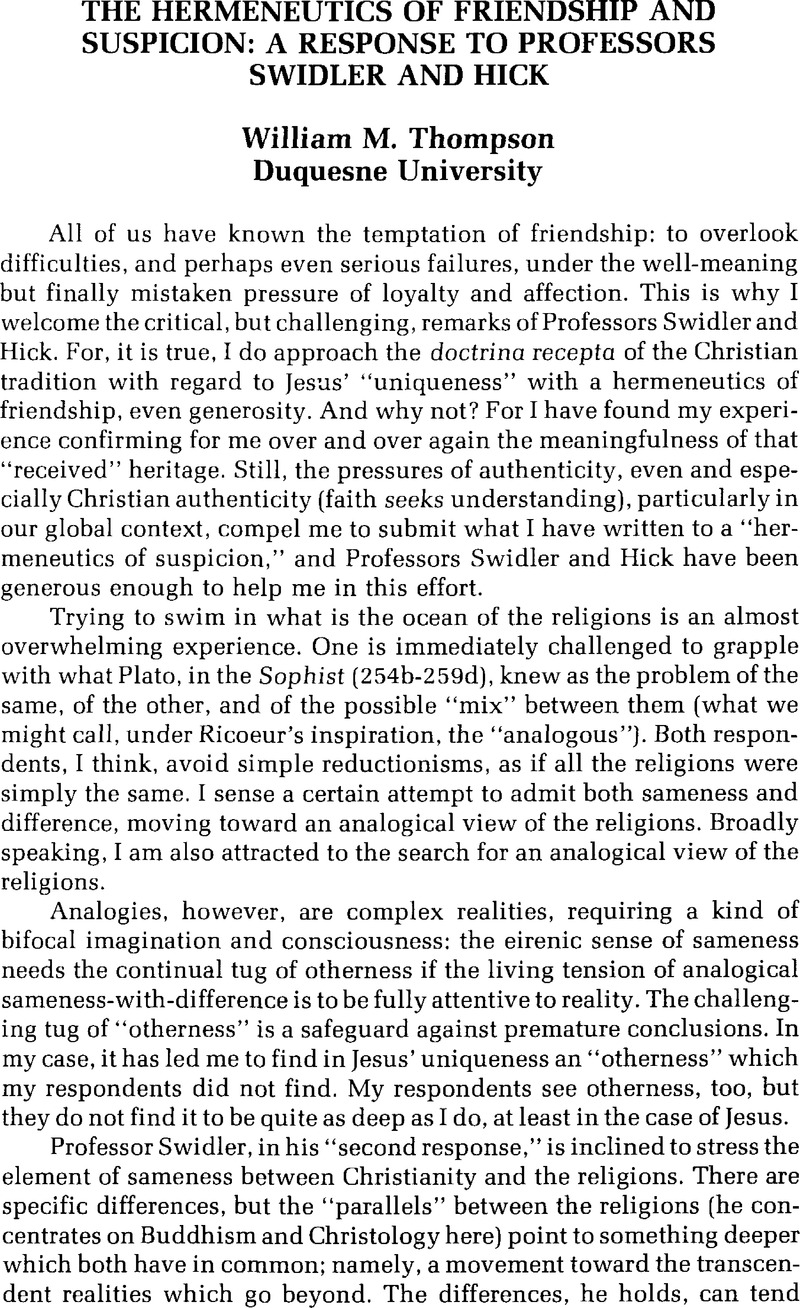No CrossRef data available.
Article contents
The Hermeneutics of Friendship and Suspicion: A Response to Professors Swidler And Hick
Published online by Cambridge University Press: 09 September 2014
Abstract

- Type
- Editorial Symposium
- Information
- Copyright
- Copyright © The College Theology Society 1989
References
* My reference to Paul Ricoeur's discussion of Plato's Sophist, concerning the same, the other, and the analogous, is to Time and Narrative, 3, trans. Blamey, Kathleen and Pellauer, David (Chicago: University of Chicago Press, 1988), pp. 142–56;Google Scholar to Tracy, David, from his The Analogical Imagination (New York: Crossroad, 1981), pp. 405–21.Google Scholar Pluralism in Tracy's sense, which he correlates with the analogical imagination, is decidedly not relativistic: see pp. 446-56.
I received a number of extensive and very helpful responses/commentaries through letters from my colleagues, and I want to express my special thanks here. Hopefully they will notice something of their concerns reflected, either in the finished draft of the article, or in my response portion. I do not think I should name names, lest I misrepresent my correspondents (they will probably recognize their concerns anyway), but let me make two further observations stimulated by these “writing” colleagues of mine.
I “lean” heavily on the differentiation of the world-transcendent God as the necessary presupposition for the Jesus event. But this differentiation appears to have been somewhat ambiguous for women, transcendence being more tightly identified with males, and immanence with females. That is the weight of Judith Ochshorn's The Female Experience and the Nature of the Divine, for example. To the extent that that happened, it certainly needs a hermeneutics of suspicion. I would be inclined to view it as one of those disastrous “cultural mortgages” (to use a Voegelinian phrase) which punctuate our ambiguous historical process. But perhaps we could view the Jesus event as a kind of divinely inspired “cleanup operation,” a critique of this denigration of immanence: for the Divine (now world-transcendent) becomes flesh. Hence, the liberating pause in history that Jesus was for women; but, sadly, just a pause only on the way to becoming an “age.”
A second correspondent wondered why the Incarnation (of Jesus) could not be, at least theoretically, repeatable by others. I want to argue that it is something we can participate in; in fact it makes a uniquely personal participation in God finally possible. But that participation, I think, must be subordinate to Jesus; not “unsurpassable.” The unsurpassable can happen only once. God has given all in Jesus. What seems logically and theologically required is not that we all are equal in all respects, but that we share in the benefits of the Incarnation in a way that is appropriate to our own unique potential. Such seems to be the mystery, and yet the appropriateness, of a personalistic universe. So perhaps we can say, what happens in Jesus is “representative” for all, but in a way appropriate to each. For us, that means in a derived, less than unsurpassable manner.


